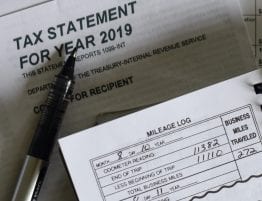
The IRS made an announcement in February this year that the interest the agency charges on tax debt will increase beginning April 1, 2022. This directly impacts taxpayers that pay less than what they owe in taxes this tax season, as they will be paying more in back taxes. Along with an increase in interest on underpayments, there will also be an increase in interest on overpayments.
The new interest rates will be:
- 4% for underpayments (by individual taxpayers and most businesses)
- 4% for overpayments (by individual taxpayers and most businesses)
- 6% for underpayments by large corporations
- 3% for overpayments by a corporation
- 1.5% for the portion of a corporate overpayment exceeding $10,000
Why the IRS Charges Interest on Underpayment of Taxes
The IRS charges interest on underpayment, which is a kind of penalty, to discourage taxpayers from paying less than what they owe in taxes. Interest is charged on the amount yet to be paid by the taxpayer, which increases the total back taxes over time. Until the full amount owed is paid, the IRS keeps charging interest on the amount that remains to be paid.
Interest is also charged on penalties for filing a return late, paying taxes after the due date of payment, understating taxes, and understating or overstating valuations.
The IRS sends notices to taxpayers with back taxes in order to inform them of the amount owed, the due date of payment, and resolution options available to them. If the amount owed in back taxes is $100,000 or more, the full amount owed needs to be paid within 10 business days from the date of the notice. If the amount owed is less than $100,000, the taxpayer has 21 calendar days from the date on the notice to make the full payment. If the IRS doesn’t receive full payment by the due date, they begin to charge interest on the amount owed till it is paid in full.
Calculating Interest on Underpayment of Taxes
Depending upon how old the tax debt is, and whether you are an individual taxpayer or a business, interest is calculated accordingly. The IRS may charge a special interest rate for underpayment of taxes in some cases. Below is the percentage of interest charged for underpayment of taxes for specific time periods.
| Period of underpayment | Underpayment of taxes (percentage rates) |
| April 1, 2009 through December 31, 2010 | 4 |
| January 1, 2011 through March 31, 2011 | 3 |
| April 1, 2011 through September 30, 2011 | 4 |
| October 1, 2011 through March 31, 2016 | 3 |
| April 1, 2016 through March 31, 2018 | 4 |
| April 1, 2018 through December 31, 2018 | 5 |
| January 1, 2019 through June 30, 2019 | 6 |
| July 1, 2019 through June 30, 2020 | 5 |
| July 1, 2020 through March 31, 2022 | 3 |
| Beginning April 1, 2022… | 4 |
Source: The IRS. Notice 746 (Rev. 3-2022)
Extension to File & Tax Debt
Many times, taxpayers incur tax debt because they confused extension to file with extension to pay. The IRS does not offer an extension to pay. Even if a taxpayer has taken an extension to file, it does not give them more time to pay their tax bill. They are required to pay their full tax liability before the tax deadline, even if they have an extension. For 2022, the tax filing and payment deadline for most taxpayers is April 18, 2022.
How Do I Remove/Reduce Interest on Tax Debt
Though taxpayers can use ‘reasonable cause’ for abatement of penalties, the IRS does not accept the same for interest. A taxpayer cannot get relief from interest by furnishing a reasonable cause where an unforeseen circumstance stopped the taxpayer from fulfilling his/her tax duties on time.
The simplest way to avoid IRS interest is to pay the taxes owed in full. If that is not possible, taxpayers may apply for IRS payment options such as Installment Agreements or Offer in Compromise. These plans allow taxpayers to pay their tax bill in installments over a period of time (Installment Agreement) or pay less than what they owe in taxes (Offer in Compromise). It is better to apply for the appropriate plan before the tax filing deadline, and avoid interest and penalties.
Conclusion
Since the IRS has increased interest rate on tax debt, taxpayers need to be more vigilant when preparing their tax return to avoid underpayment of taxes. Taxpayers with limited financial capacity can opt for IRS tax debt payment plans such as Installment Agreements or Offer in Compromise where they work with the IRS to comfortably fulfill their tax obligations.








